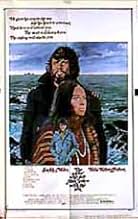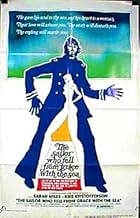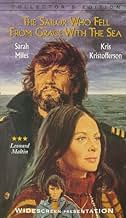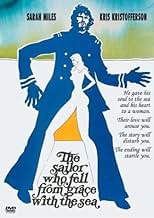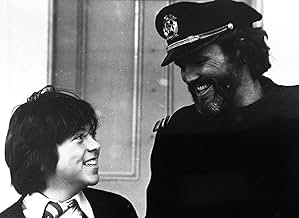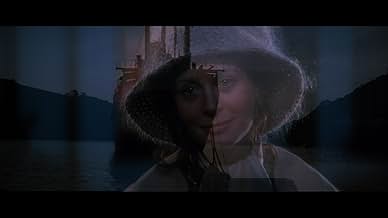IMDb RATING
6.2/10
1.8K
YOUR RATING
After his father dies, a disturbed young boy plots to take revenge on the new man in his mother's life.After his father dies, a disturbed young boy plots to take revenge on the new man in his mother's life.After his father dies, a disturbed young boy plots to take revenge on the new man in his mother's life.
- Director
- Writers
- Stars
- Awards
- 2 nominations total
Charles Adey-Grey
- Man in Tea Room
- (uncredited)
Mabel Etherington
- Woman in Tea Room
- (uncredited)
Juba Kennerley
- Man in Tea Room
- (uncredited)
- Director
- Writers
- All cast & crew
- Production, box office & more at IMDbPro
Featured reviews
This is a very chilling movie based on an even more chilling novel. It does seem to be a cross between "Oedipus Rex" and "Lord of the Flies" as some reviewers have astutely pointed out, but it is actually based on an obscure Japanese novella. The original story had a Japanes protagonist and was set in a Japanese fishing village. The filmmakers don't entirely succeed in transplanting the action to rural England and casting a Kris Kristoferson in the lead role, but an international film never could have gotten made at the time with a Japanese lead, and once they cast Kristoferson, setting the movie in a Japanese fishing village would have drawn the inevitable charges of racism from the perpetually outraged idiots in the "PC" crowd.
Besides the awkwardness of the adaptation is redeemed by some great acting. This is probably Kristoferson's second best role after "Pat Garret and Billy the Kid". Sarah Miles is also very good as the lonely widow. Her sex scenes with Kristoferson are very erotic if very perverse (you see them only through a peephole as her disturbed son watches). The British child actors are also very good for a change, particularly the very disturbed but nevertheless sympathetic son and the truly psychopathic leader of the gang of schoolboys he runs with (who make the "Children of the Damned" look cute and cuddly by comparison). The scene where the gang eviscerates a live cat is almost unbearable to watch. And the final scene on a hill overlooking the sea is chilling, tragic, fatalistic, beautiful, and mythic all at once. This is and haunting and unforgettable movie.
Besides the awkwardness of the adaptation is redeemed by some great acting. This is probably Kristoferson's second best role after "Pat Garret and Billy the Kid". Sarah Miles is also very good as the lonely widow. Her sex scenes with Kristoferson are very erotic if very perverse (you see them only through a peephole as her disturbed son watches). The British child actors are also very good for a change, particularly the very disturbed but nevertheless sympathetic son and the truly psychopathic leader of the gang of schoolboys he runs with (who make the "Children of the Damned" look cute and cuddly by comparison). The scene where the gang eviscerates a live cat is almost unbearable to watch. And the final scene on a hill overlooking the sea is chilling, tragic, fatalistic, beautiful, and mythic all at once. This is and haunting and unforgettable movie.
The script and direction meld into a strong movie. With charm and humor to spare, this film was among the top echelon of movies from 1976. The characters in this film have a lot of depth, and that makes all the difference. In the end, the audience gets a casserole of film elements and little of the satisfaction that comes from watching these types of movies. I guess if I was in a bad mood, this movie wouldn't be half as good, but I thought it to be enjoyable and would recommend it. This is a story about a place most people might not be able to conceive. It is a powerful film. Many scenes do not feel believable, but good performances help to enhance this story.
This is a British drama from 1976 about a shy and lonely widow Anne (Sarah Miles) raising up her 13-year-old son in a small English seaside city. When she meets the American sailor Jim (Kris Kristofferson), she falls in love with him and wants to marry him. Her son, being a member of a fascist secret circle led by the charismatic pupil "Chief", doesn't agree with that liaison and uses his radical friends against his possible stepfather...
The German title of this brilliant movie was called "Der Weg allen Fleisches" which means as much as "The way of all flesh". This is a suitable title as love, loneliness, seduction, longings and sex are integral elements of the story.
The director uses surreal scenes to support the emotional side of the movie. There is a beautifully shot sex scenes between Anne and Jim, and an outstanding masturbation scene of Anne in front of a mirror, secretly watched by her son. There are strange dream sequences, spiritual moods of the sea and a cruel scene where the gang's leader rips off a dead cat to present his totalitarian theories to his worshippers by its testicles.
Sarah Miles ("Blow-up", "Venom"), Kris Kristofferson ("Pat Garrett and Billy the Kid", "Convoy") and also the children actors are doing a fine job here. The touching score was written by Johnny Mandel, and Kris Kristofferson added his chilling "Sea Dream Theme". This film is more than just a love drama but an outstanding and forgotten tale about love, sex and death at the seaside with great locations and a very strange ending. Watch it if you get the occasion to do so!
The German title of this brilliant movie was called "Der Weg allen Fleisches" which means as much as "The way of all flesh". This is a suitable title as love, loneliness, seduction, longings and sex are integral elements of the story.
The director uses surreal scenes to support the emotional side of the movie. There is a beautifully shot sex scenes between Anne and Jim, and an outstanding masturbation scene of Anne in front of a mirror, secretly watched by her son. There are strange dream sequences, spiritual moods of the sea and a cruel scene where the gang's leader rips off a dead cat to present his totalitarian theories to his worshippers by its testicles.
Sarah Miles ("Blow-up", "Venom"), Kris Kristofferson ("Pat Garrett and Billy the Kid", "Convoy") and also the children actors are doing a fine job here. The touching score was written by Johnny Mandel, and Kris Kristofferson added his chilling "Sea Dream Theme". This film is more than just a love drama but an outstanding and forgotten tale about love, sex and death at the seaside with great locations and a very strange ending. Watch it if you get the occasion to do so!
It's a compelling, morbid film most of the time - but what's up with the ending? It builds up (competently and suspensefully) to a situation that can easily be guessed right from the beginning, and then....it just stops, as if being afraid of going "too far". Perhaps the novel ends the same way, but in this movie it doesn't work - it renders the whole film pointless. The hyped-up erotic scenes are brief and too darkly photographed, but the performances are right on target. (**1/2)
An unforgettable and profoundly disturbing story centered on a widow, Anne, and her only son, Jonathan, in a remote English seaside town. Jonathan belongs to a gang led by a precociously intelligent sociopath known only as Chief, who through sheer force of will and intellect, indoctrinates them with a quasi-Neitzchean philosophy of ultimate superiority and the non-existence of morality. When Kris Kristofferson's Captain Jim arrives in town, and strikes up a passionate relationship with the lonely Anne, Jonathan sees him as a heroic masculine prototype, removed from society and living a 'true' life on the open sea. But when the Captain decides to settle down and marry Anne, Jonathan takes it as an ultimate and unforgivable betrayal, and exacts a terrible revenge.
Based on the 1963 Mishima novel, "The Sailor Who Fell From Grace With The Sea" hints at many themes, from Jonathan's Oedipal obsession with spying on his mother's bedroom to his physical admiration of the Captain that verges on latent homosexuality. The atmosphere, masterfully created by veteran cinematographer Douglas Slocombe, is one of darkly brooding clouds, gray seas, and an air that constantly threatens rain. The (in)famous sex scenes are really not that explicit, and the casual violence exhibited by the children is far more shocking than any glimpse of breast or buttock.
The film, for all its brilliantly evocative atmosphere, excellent performances, and quietly brooding menace, is not without its flaws. The score is terrible, all mawkish piano and sickly clarinet. It is often overly intrusive and distracts from the overall sense of ripe stillness that director Carlino conjures throughout the film. But in general, the film is a remarkable experience, and one that any viewer is unlikely to forget quickly.
Based on the 1963 Mishima novel, "The Sailor Who Fell From Grace With The Sea" hints at many themes, from Jonathan's Oedipal obsession with spying on his mother's bedroom to his physical admiration of the Captain that verges on latent homosexuality. The atmosphere, masterfully created by veteran cinematographer Douglas Slocombe, is one of darkly brooding clouds, gray seas, and an air that constantly threatens rain. The (in)famous sex scenes are really not that explicit, and the casual violence exhibited by the children is far more shocking than any glimpse of breast or buttock.
The film, for all its brilliantly evocative atmosphere, excellent performances, and quietly brooding menace, is not without its flaws. The score is terrible, all mawkish piano and sickly clarinet. It is often overly intrusive and distracts from the overall sense of ripe stillness that director Carlino conjures throughout the film. But in general, the film is a remarkable experience, and one that any viewer is unlikely to forget quickly.
Did you know
- TriviaFirst English language filmed adaptation of a novel by Japanese writer Yukio Mishima.
- Alternate versionsUS DVD version is cut. Sex scenes of Sarah Miles are tamed down in US version.
- ConnectionsReferenced in Fantasm Comes Again (1977)
- How long is The Sailor Who Fell from Grace with the Sea?Powered by Alexa
Details
Contribute to this page
Suggest an edit or add missing content

